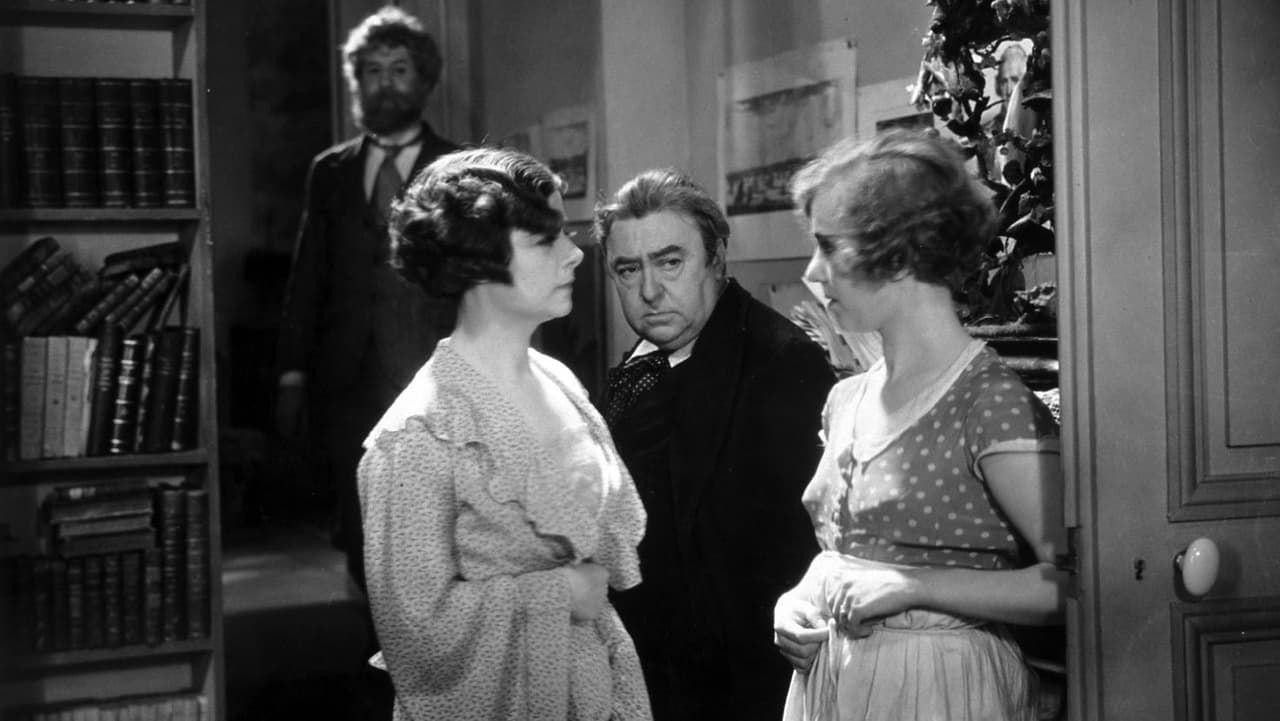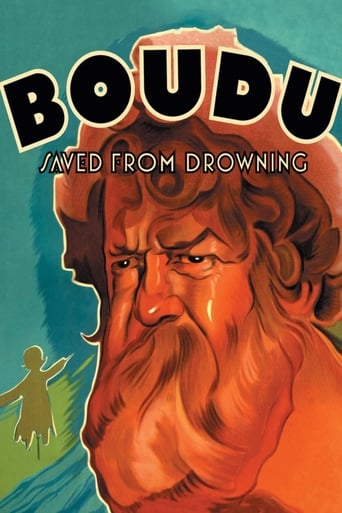

This picture may have had more relevance in the 30's and now serves as a relic of an earlier time. Boudu is a Parisian bum and apparently has had no upbringing to speak of. He is a slob with no grace or manners and shows no inclination towards civility or gratitude, despite repeated efforts to show him kindness and hospitality. He is rude and feral and, probably least of all his faults, he is dirty.His anti-social nature, though, is what makes the film strikingly funny, or perhaps shockingly so. Are there people, long ago or even now, who could get away with such behavior? It is the 30's and in Paris there is evidently a marked division in classes, to which Boudu is oblivious and impervious. Michele Simon is outstanding in the title role, and his character's persona makes you wonder if he were worth saving. A one-of-a-kind story which is worth watching in spite of its outrageous premise.
... View MoreAn earlier reviewer noted that Simon's character in Renoir's La Chienne is a "metamorphosis" partner of Boudu. I cannot verify that per se, but it is interesting to point out that many of the stylistic developments in La Chienne carry over into Boudu. There is amazing depth of field - through windows (like Chienne... or M. Lange), exteriors (the hunt for Boudu's dog is exemplary) and especially in the Lestingois house. Renoir utilizes long pans to help construct the space. Again, Renoir positions the camera in a manner where there are obstructions to a full view created by objects in the space. This technique fosters a sense of realism through the unobtrusive camera. Narrow corridors abound and provide for deep staged setups. Renoir is finally liberating the camera and allowing for some of his later 'signature' mobile framing shots. The long take is also being introduced into the stylistic system... one of the final shots of Boudu floating in the canal as the Blue Danube Waltz plays in the soundtrack reminds us that originality in auteurship is still borne of influence and respect (Kubrick's 2001). Renoir also pays some respect to the French Impressionist filmmaker colleagues of his from years past. His novel use of sound as bridges between scenes is as creative and compelling as the ways in which avant-gardists were bridging with images in the silent era. Renoir also continues with practical applications of sound which began in On Purge. He positions a police officer with back facing the camera creating an ominous sense of authority when provided spoken lines. Although I am not a huge fan of Renoir's Hollywood productions, the drowning sequence in Boudu surely influenced some of the action sequences in a film like This Land is Mine (1943). The drowning sequence in Boudu is composed of a montage of shots, with unique angles and povs. The sound during the sequence is diegetic - traffic and crowds - which adds a suspense built around milieu realism as opposed to theatrical drama. Boudu (played excellently by Simon) is an incorrigible rascal whose physical comedy evokes laughing out loud (Chaplin, Keaton and the like). However, there are deep social relationships at play and it isn't so reducible to a critique of "misguided" bourgeois charity. We must be reminded that as sentimental as Boudu can be, it is also clear that he is mentally ill. I find it preposterous to believe that Renoir would be condemning a socio-economic class for diseases of the mind which discriminate against no one. My thesis for now is that Renoir is an impresario of the film medium above all else and as such sought to provide a pleasurable experience for the spectator. The treatment of Boudu remains lighthearted... enough so to not rouse suspicion of moral implications for the scenario. Again, Renoir is not so ambiguous or ambivalent in his politics as he is committed and determined to rendering a film experience that satisfies the myriad of audiences that might be in attendance. To that end he succeeds marvelously with this film.
... View MoreBoudu Saved From Drowning offers a remarkably even-handed look at class relations. While some characters, such as a group of policeman unwilling to help a bum search for his missing dog but all too willing to jump to the aid of a lovely woman missing a more materially valuable animal, obviously behave negatively, others have good points to match their bad. In fact, sometimes the characters from different social classes are almost too similar. The film centers around Lestingois, a generous member of the middle class who is most happy when avoiding his stuffy wife to hang around with his saucy maid. Lestingois risks his life to rescue Boudu, an uncultured bum who loses his desire to continue living once he is parted from his only companion. Oddly enough, Lestingois has also lost one of his closest companions as the film begins, yet he hardly seems to care about his missing friend at all. By contrast, Boudu, a man that generally cares little about those around him, is deeply disturbed by his own loss. Still, once Boudu's actions reveal that he's happiest when avoiding Lestingois' wife to woo the maid, it becomes clear that the two aren't so different after all, manners notwithstanding. The culture clash in Boudu Saved From Drowning is good for a few moments of genuine comedy, though they mostly are provided by situational irony, the same inferior type of humor that gave rise to the "sit-com." As a result, the film isn't quite as funny as it might have been. Renoir is more than capable of handling the technical aspects here, though his direction is a bit more restrained than it had been in his previous two pictures. Since I prize the innovative techniques on display in his rawer efforts more highly than the staid professionalism he exhibits here, this was a slight problem for me. I suppose there is much to appreciate in Renoir's carefully composed shots, yet I couldn't help but feel that a refusal to innovate is equivalent to taking the easy way out for a director of Renoir's talents. Nevertheless, Boudu Saved From Drowning is a well made film full of clever social commentary and as such is worthwhile viewing for anyone.
... View MoreNo one, including the critics on the Criterion supplements, remarks on the fact that Boudou is saved from drowning. But more than that, from suicide. The obvious clashes between, free-spirits and bourgeoisie, Apollo & Dionysus, order and chaos, are there of course. But doesn't Boudou's attempt at suicide..in the title after all..deserve some notice. The fact that he seems happy at the end, may mean that after viewing the way the other half (or is it the other 90%) lives, he realizes his original life wasn't too bad after all. Meaning a clear winner, or does it? None of the bourgeoisie are so unhappy they think to snuff it.
... View More